Device can heat home, save money
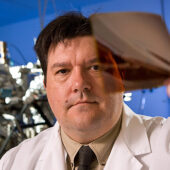 A new polymer-based solar-thermal device is the first to generate power from both heat and visible sunlight – an advance that could shave the cost of heating a home by as much as 40 percent, according to research done at Wake Forest.
A new polymer-based solar-thermal device is the first to generate power from both heat and visible sunlight – an advance that could shave the cost of heating a home by as much as 40 percent, according to research done at Wake Forest. Categories: Research & Discovery, University Announcements

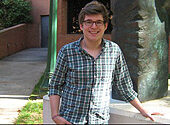 Stowe Nelson ('08) provides the sounds behind “Eurydice,” a play directed by Brook Davis (‘90), which opens today in the Ring Theatre and runs through April 23.
Stowe Nelson ('08) provides the sounds behind “Eurydice,” a play directed by Brook Davis (‘90), which opens today in the Ring Theatre and runs through April 23.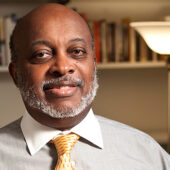 An increasingly vocal group of experts is calling attention to the growing divide between the big business of NCAA sports and the well-being of student athletes who are generating record revenues for their universities.
An increasingly vocal group of experts is calling attention to the growing divide between the big business of NCAA sports and the well-being of student athletes who are generating record revenues for their universities. Meditation produces powerful pain-relieving effects in the brain, according to new research published in the Journal of Neuroscience by Fadel Zeidan, a post-doctoral research fellow at Wake Forest Baptist Medical Center.
Meditation produces powerful pain-relieving effects in the brain, according to new research published in the Journal of Neuroscience by Fadel Zeidan, a post-doctoral research fellow at Wake Forest Baptist Medical Center. What started as an idea for an iPad application by professors A. Daniel Johnson and Jed Macosko evolved into a more accessible tool for the next generation of electronic textbooks called “BioBook.” The project will be funded by a Next Generation Learning Challenges grant.
What started as an idea for an iPad application by professors A. Daniel Johnson and Jed Macosko evolved into a more accessible tool for the next generation of electronic textbooks called “BioBook.” The project will be funded by a Next Generation Learning Challenges grant.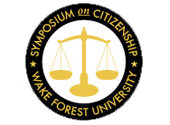 Students in Alessandra Beasley Von Burg's communications class are putting what they've learned in the classroom about citizenship into action with a symposium today on the rights and responsibilities of citizenship. The symposium is free and open to the public.
Students in Alessandra Beasley Von Burg's communications class are putting what they've learned in the classroom about citizenship into action with a symposium today on the rights and responsibilities of citizenship. The symposium is free and open to the public. To chart a course of action for the protection of American Indian land rights, scholars, policy makers and community members will gather to consider issues such as environmental pollution and the protection of sacred sites.
To chart a course of action for the protection of American Indian land rights, scholars, policy makers and community members will gather to consider issues such as environmental pollution and the protection of sacred sites.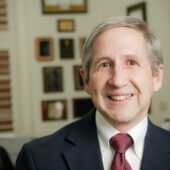 Role playing, writing or drawing what one is feeling can have significant therapeutic value. Counseling professor Samuel T. Gladding (’67, MAEd ’71) is one of the country’s leading authorities on how using the creative arts — music, dance, visual art, humor, drama and writing — can help people become more in tune with their emotions and feelings.
Role playing, writing or drawing what one is feeling can have significant therapeutic value. Counseling professor Samuel T. Gladding (’67, MAEd ’71) is one of the country’s leading authorities on how using the creative arts — music, dance, visual art, humor, drama and writing — can help people become more in tune with their emotions and feelings. On April Fools’ Day, Cindy Gendrich’s students may have an advantage when planning practical jokes. In the theater professor’s first-year seminar, “Why Do People Laugh?” they have serious discussions about what causes giggles and guffaws.
On April Fools’ Day, Cindy Gendrich’s students may have an advantage when planning practical jokes. In the theater professor’s first-year seminar, “Why Do People Laugh?” they have serious discussions about what causes giggles and guffaws.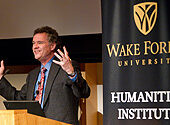 The Humanities Institute is designed to “help faculty and students make the most of the energy, intellect and creativity they bring to humanistic learning, research and teaching,” according to director Mary Foskett. Read more in our Old Gold and Black story of the week.
The Humanities Institute is designed to “help faculty and students make the most of the energy, intellect and creativity they bring to humanistic learning, research and teaching,” according to director Mary Foskett. Read more in our Old Gold and Black story of the week.